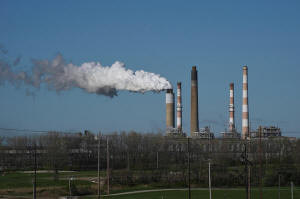Trump EPA moves to repeal climate rules that limit greenhouse gas
emissions from US power plants
[June 12, 2025]
By MATTHEW DALY
WASHINGTON (AP) — The Environmental Protection Agency on Wednesday
proposed repealing rules that limit planet-warming greenhouse gas
emissions from power plants fueled by coal and natural gas, an action
that Administrator Lee Zeldin said would remove billions of dollars in
costs for industry and help “unleash” American energy.
The EPA also proposed weakening a regulation that requires power plants
to reduce emissions of mercury and other toxic pollutants that can harm
the brain development of young children and contribute to heart attacks
and other health problems in adults.
The rollbacks are meant to fulfill Republican President Donald Trump's
repeated pledge to “ unleash American energy ” and make it more
affordable for Americans to power their homes and operate businesses.
If approved and made final, the plans would reverse efforts by
Democratic President Joe Biden's administration to address climate
change and improve conditions in areas heavily burdened by industrial
pollution, mostly in low-income and majority Black or Hispanic
communities.
The power plant rules are among about 30 environmental regulations that
Zeldin targeted in March when he announced what he called the “most
consequential day of deregulation in American history.”
Zeldin said Wednesday the new rules would help end what he called the
Biden and Obama administrations’ “war on so much of our U.S. domestic
energy supply.”
“The American public spoke loudly and clearly last November,'' he added
in a speech at EPA headquarters. “They wanted to make sure that … no
matter what agency anybody might be confirmed to lead, we are finding
opportunities to pursue common-sense, pragmatic solutions that will help
reduce the cost of living … create jobs and usher in a golden era of
American prosperity.”

Environmental and public health groups called the rollbacks dangerous
and vowed to challenge the rules in court.
Dr. Lisa Patel, a pediatrician and executive director of the Medical
Society Consortium on Climate & Health, called the proposals “yet
another in a series of attacks” by the Trump administration on the
nation's “health, our children, our climate and the basic idea of clean
air and water.”
She called it “unconscionable to think that our country would move
backwards on something as common sense as protecting children from
mercury and our planet from worsening hurricanes, wildfires, floods and
poor air quality driven by climate change.”
“Ignoring the immense harm to public health from power plant pollution
is a clear violation of the law,'' added Manish Bapna, president and CEO
of the Natural Resources Defense Council. “If EPA finalizes a slapdash
effort to repeal those rules, we’ll see them in court.”
The EPA-targeted rules could prevent an estimated 30,000 deaths and save
$275 billion each year they are in effect, according to an Associated
Press examination that included the agency’s own prior assessments and a
wide range of other research.
It’s by no means guaranteed that the rules will be entirely eliminated —
they can’t be changed without going through a federal rulemaking process
that can take years and requires public comment and scientific
justification.
Even a partial dismantling of the rules would mean more pollutants such
as smog, mercury and lead — and especially more tiny airborne particles
that can lodge in lungs and cause health problems, the AP analysis
found. It would also mean higher emissions of greenhouse gases, driving
Earth’s warming to deadlier levels.
Biden, a Democrat, had made fighting climate change a hallmark of his
presidency. Coal-fired power plants would be forced to capture
smokestack emissions or shut down under a strict EPA rule issued last
year. Then-EPA head Michael Regan said the power plant rules would
reduce pollution and improve public health while supporting a reliable,
long-term supply of electricity.
[to top of second column]
|

The Warrick Power Plant, a coal-fired electricity-generating
station, operates, April 8, 2025, in Newburgh, Ind. (AP Photo/Joshua
A. Bickel, File)

The power sector is the nation’s second-largest contributor to climate
change, after transportation.
In its proposed regulation, the Trump EPA argues that carbon dioxide and
other greenhouse gases from fossil fuel-fired power plants “do not
contribute significantly to dangerous pollution” or climate change and
therefore do not meet a threshold under the Clean Air Act for regulatory
action. Greenhouse gas emissions from coal and gas-fired plants “are a
small and decreasing part of global emissions,'' the EPA said, adding:
“This Administration’s priority is to promote the public health or
welfare through energy dominance and independence secured by using
fossil fuels to generate power.”
The Clean Air Act allows the EPA to limit emissions from power plants
and other industrial sources if those emissions significantly contribute
to air pollution that endangers public health.
If fossil fuel plants no longer meet the EPA’s threshold, the Trump
administration may later argue that other pollutants from other
industrial sectors don’t either and therefore shouldn’t be regulated,
said Meghan Greenfield, a former EPA and Justice Department lawyer now
in private practice at Jenner & Block LLP.
The EPA proposal “has the potential to have much, much broader
implications,” she said.
Zeldin, a former New York congressman, said the Biden-era rules were
designed to “suffocate our economy in order to protect the environment,”
with the intent to regulate the coal industry “out of existence” and
make it “disappear.”
National Mining Association president and CEO Rich Nolan applauded the
new rules, saying they remove “deliberately unattainable standards” for
clean air while “leveling the playing field for reliable power sources,
instead of stacking the deck against them.”
But Dr. Howard Frumkin, a former director of the National Center for
Environmental Health and professor emeritus at the University of
Washington School of Public Health, said Zeldin and Trump were trying to
deny reality.
“The world is round, the sun rises in the east, coal- and gas-fired
power plants contribute significantly to climate change, and climate
change increases the risk of heat waves, catastrophic storms and many
other health threats,” Frumkin said. “These are indisputable facts. If
you torpedo regulations on power plant greenhouse gas emissions, you
torpedo the health and well-being of the American public and contribute
to leaving a world of risk and suffering to our children and
grandchildren.”
A paper published earlier this year in the journal Science found the
Biden-era rules could reduce U.S. power sector carbon emissions by 73%
to 86% below 2005 levels by 2040, compared with a reduction of 60% to
83% without the rules.

“Carbon emissions in the power sector drop at a faster rate with the
(Biden-era) rules in place than without them,” said Aaron Bergman, a
fellow at Resources for the Future, a nonprofit research institution and
a co-author of the Science paper. The Biden rule also would result in
“significant reductions in sulfur dioxide and nitrogen oxides,
pollutants that harm human health,” he said.
___
Associated Press writers Michael Phillis and Seth Borenstein contributed
to this story.
All contents © copyright 2025 Associated Press. All rights reserved |